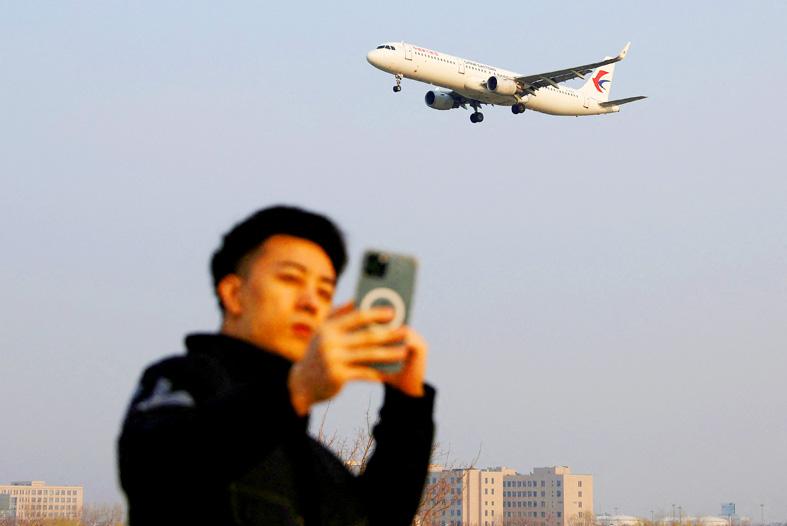China Eastern Airlines Corp (中國東方航空) has resumed flights using the same type of plane that recently crashed in southern China, a sign that it is working toward putting the entire fleet back in the air.
A 737-800 jet flew from Kunming to Chengdu on Sunday, according to flightradar24.com.
Other planes of the same model made by Boeing Co have been used in what appeared to be test flights, including near Shanghai.

Photo: Reuters
Xinhua news agency yesterday reported that the airline has returned the 737-800 to commercial service, without saying how it got the information.
Planes with similar registration numbers to the one that went down on March 21 killing all 132 people on board were still being evaluated, it said.
China Eastern grounded more than 200 of the Boeing 737-800 planes after the crash in Wuzhou, in the Guangxi region. Flight 5735 from Kunming to Guangzhou was cruising at about 8,840m when it suddenly dove, slamming into a forested hillside about 160km from its destination.
Investigators retrieved the two “black boxes” from the crash site — one that recorded voices in the cockpit and another that captured flight data — and sent them to the US. The hope is that information on the devices will help solve the mystery of what happened to the jet, which disintegrated into tens of thousands of pieces on impact.
A preliminary report is to be produced this week, as required by UN standards governing the aviation industry, and a full report is expected within 12 months.

STEEP DECLINE: Yesterday’s drop was the third-steepest in its history, the steepest being Monday’s drop in the wake of the tariff announcement on Wednesday last week Taiwanese stocks continued their heavy sell-off yesterday, as concerns over US tariffs and unwinding of leveraged bets weighed on the market. The benchmark TAIEX plunged 1,068.19 points, or 5.79 percent, to 17,391.76, notching the biggest drop among Asian peers as it hit a 15-month low. The decline came even after the government on late Tuesday authorized the NT$500 billion (US$15.2 billion) National Stabilization Fund (國安基金) to step in to buoy the market amid investors’ worries over tariffs imposed by US President Donald Trump. Yesterday’s decline was the third-steepest in its history, trailing only the declines of 2,065.87 points on Monday and

TAKING STOCK: A Taiwanese cookware firm in Vietnam urged customers to assess inventory or place orders early so shipments can reach the US while tariffs are paused Taiwanese businesses in Vietnam are exploring alternatives after the White House imposed a 46 percent import duty on Vietnamese goods, following US President Donald Trump’s announcement of “reciprocal” tariffs on the US’ trading partners. Lo Shih-liang (羅世良), chairman of Brico Industry Co (裕茂工業), a Taiwanese company that manufactures cast iron cookware and stove components in Vietnam, said that more than 40 percent of his business was tied to the US market, describing the constant US policy shifts as an emotional roller coaster. “I work during the day and stay up all night watching the news. I’ve been following US news until 3am

Six years ago, LVMH’s billionaire CEO Bernard Arnault and US President Donald Trump cut the blue ribbon on a factory in rural Texas that would make designer handbags for Louis Vuitton, one of the world’s best-known luxury brands. However, since the high-profile opening, the factory has faced a host of problems limiting production, 11 former Louis Vuitton employees said. The site has consistently ranked among the worst-performing for Louis Vuitton globally, “significantly” underperforming other facilities, said three former Louis Vuitton workers and a senior industry source, who cited internal rankings shared with staff. The plant’s problems — which have not

TARIFF CONCERNS: The chipmaker cited global uncertainty from US tariffs and a weakening economic outlook, but said its Singapore expansion remains on track Vanguard International Semiconductor Corp (世界先進), a foundry service provider specializing in producing power management and display driver chips, yesterday withdrew its full-year revenue projection of moderate growth for this year, as escalating US tariff tensions raised uncertainty and concern about a potential economic recession. The Hsinchu-based chipmaker in February said revenues this year would grow mildly from last year based on improving supply chain inventory levels and market demand. At the time, it also anticipated gradual quarter revenue growth. However, the US’ sweeping tariff policy has upended the industry’s supply chains and weakened economic prospects for the world economy, it said. “Now